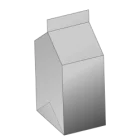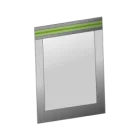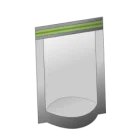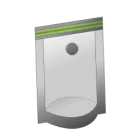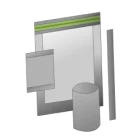Paper Packaging, Plastic Food Containers, Packing Peanuts, and Other Packaging Materials
Choosing the right packaging materials is critical to ensuring product protection, functionality, sustainability, and cost-effectiveness. Packaging materials are vital for ensuring the functionality, safety, and appeal of a product. It should be durable enough to ensure that the material can withstand handling, shipping, and storage conditions. The packaging material should offer protection against moisture, air, light, or contaminants, depending on the product’s needs. Paper packaging allows for high-quality branding and labeling, while resealable, easy-to-open, or portable packaging enhances user experience.
Paper can be used for a wide variety of packaging needs, such as boxes, bags, wraps, and cushioning. Paper packaging is gaining popularity due to its eco-friendliness, versatility, and functional benefits. It decomposes naturally, reducing environmental impact compared to plastics. Made from wood pulp, paper packaging is derived from a renewable source, especially when sourced from sustainably managed forests. Multi-layered paper packaging can offer strength and durability, protecting contents from damage.
Plastic food containers
Food containers are used to maintain the freshness, taste, and quality of food by protecting it from environmental factors like air, moisture, and bacteria. Plastic food containers are popular storage solutions made from various types of plastic. They are used to store, transport, and preserve food in households, restaurants, and industries due to their versatility, lightweight design, and affordability. These are convenient, customizable, and durable also. Plastic food containers are popular due to their practicality, cost-effectiveness, and versatility. They are much lighter than alternatives like glass or metal, making them easy to carry and ideal for on-the-go use. They are resistant to breakage, unlike glass or ceramics, making them safer and more robust for everyday handling.
Clear plastic containers allow users to easily see the contents without opening them, making organization and identification more convenient. Many plastic food containers available at Entrepouch are designed with airtight and leak-proof seals, which help maintain freshness, prevent spills, and protect food from contamination.
Some of the common materials used in the manufacturing of plastic food containers are:
• Polypropylene (PP)
• Polyethylene Terephthalate (PET)
• High-Density Polyethylene (HDPE)
• Low-Density Polyethylene (LDPE)
• Polystyrene (PS)
Our plastic food containers are available in various shapes, sizes, and designs for specific uses. These are resistant to cracking or breaking, and suitable for frequent use. Options include airtight lids, compartments, and transparent bodies.
Packing peanuts of various shapes and sizes
Packing peanuts, also known as foam peanuts or loose fill, are lightweight, small, peanut-shaped pieces of cushioning material used for packaging. They are designed to fill empty spaces in shipping boxes and protect fragile items from damage during transportation. Packing peanuts absorb shocks and vibrations, protecting delicate items like glassware, electronics, or ceramics. Being lightweight, packing peanuts add minimal weight to packages, reducing shipping costs. Polystyrene peanuts protect items from moisture during transport while biodegradable packing peanuts can be reused for multiple shipments.
Available in traditional polystyrene and biodegradable options, packing peanuts absorb shocks and prevent damage to goods. Packing peanuts are a practical solution for protecting fragile items during shipping, with biodegradable options offering an eco-friendly alternative to traditional polystyrene. While they have some drawbacks, such as environmental impact and static issues, their cushioning properties and versatility make them a popular choice in the packaging industry. Packing peanuts remain a popular choice for void fill, with biodegradable options gaining favor as a sustainable alternative.


